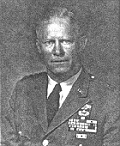 |
 |
 |
General Hugh Pate Harris was born in Anderson, Alabama
and graduated from Columbia Military Academy before entering
the U.S. Military Academy, West Point. He was commissioned a
Second Lieutenant of Infantry in 1931. Early in his carrer he led in the development of the
Army's Experimental Airborne/Air Transportability efforts. He
held key staff positions in the fledgling Airborne Command. He
served as Chief of Staff of the 13th Airborne Division in 1943.
Gen. Harris held every key position associated with the
ongoing development of the Army's Airborne Command. He also advised
and assisted the Canadian Army's Airborne efforts. In 1951 he
was Chief of Staff of the XVIII Airborne Corps, Ft. Bragg, N.C.
He served as Regimental Commander during the war in Korea in
1953 with the 40th Infantry Division. Gen. Harris then became
Deputy Chief of Staff, Eighth Army in Korea. He took over the Berlin Command, U.S. Army, Europe. In
1956 Gen. Harris took command of the 11th Airborne Division,
Seventh U.S. Army, Europe. In April, 1960 Gen. Harris became
Commanding General, U.S. Army Infantry Center and Commandant,
U.S. Army Infantry School, Ft. Benning, GA. The next year he
assumed command of I Corps (Group) and then Commanding General,
Seventh U.S. Army, Europe. He received his promotion to Four
Stars in 1962 awarded by President John F. Kennedy. Gen. Harris has received more than 20 citations and decorations
including the Distinguished Service Medal, Silver Star, three
Legion of Merit Awards, The Combat Infantry, Glider and Parachute
Badges. He closed his military career as President of the Citadel,
Charleston, S.C. in 1964, relieving Gen. Mark Clark of WWII fame. |
|
